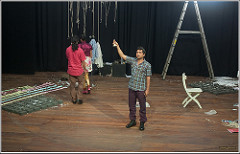Being an actor is not an easy profession. I understand the challenges it entails, or else I would pursue it myself. As a director, I mostly stay behind the camera, but I try to imagine what it’s like to be an actor. I have great respect for those who put themselves in front of the camera and face all the vulnerabilities that come with it.
One of my least favorite things to hear from an actor is, “What is my motivation Drive by Daniel Pink - Book Evaluation - by Stacie Stacie Stacie People often don't understand what drives me at work. I can spend countless hours writing articles or working on my newsletter. I might also be active on Twitter, connecting with potential clients, business partners, and engaging with interesting people. I frequently attend in-person networking meetings and events. A common comment I… ?” When an actor asks me this, it feels like they haven’t done their research. Not only have they not read the script, but they haven’t given any thought beyond their own role. You can discover your motivation by studying the other characters in the script. Skilled and experienced actors know how to do this. That’s also why actors can make fantastic screenwriters. Analyzing the script is part of your job as an actor. You should understand not only your character’s arc but also the arcs of all the other characters. Additionally, you need to grasp every scene in relation to the overall story and premise.
Another issue I frequently encounter with actors is their inability to differentiate between theater and film. Hitting your mark is not just about standing on the “X” on the ground and being in the light. The most crucial aspect is your position within the frame. Remember that film is essentially a moving picture. As a director, I strive for excellent composition. It’s the art form of film—the look and composition of each shot. I want my actors to be framed within the image. I want the background to be positioned around the actor to create a visually stunning composition.
When I work with actors who can’t find the light within the frame, it forces me to shoot wider shots. The problem with wide shots is that your entire body is in the frame. This poses challenges with body language. Many actors struggle with gestures that appear unnatural or reveal their nervousness, despite their great acting. In my opinion, this is the second sign of a novice actor, right after failing to deliver the right tone in their dialogue.
When I direct, I often like to do an extra take or two after capturing the necessary shots. I do this to provide the editor with more footage to work with during post-production. I encourage the actors to deliver the line in a different way, adjusting the tone of their delivery slightly. They can add more or less emotion than initially intended. The editor will select the delivery that they believe helps convey the character’s motivations in the scene more effectively. I also use this technique while filming, instead of simply telling the actor to show more passion or tone it down. I understand that actors have a million things to consider. The last thing I want is for them to feel they are doing a poor job. I want the actor to genuinely experience the emotions of their character in that particular scene.
Great actors become exceptional because they have a wealth of experience. The more time you spend in front of the camera, the more proficient you become. I encourage all actors to seize as many opportunities as they can, even unpaid ones. Consider each production as a learning experience to enhance your acting skills. In my opinion, experience is the most valuable tool for honing your craft.
Manuel Marino is a seasoned Senior Producer, Music Composer, and Artist with over a decade of experience. He specializes in branded entertainment across various mediums, including video games, films, and advertising campaigns. With 20+ years as a game music composer, Manuel has worked on numerous platforms, creating diverse orchestral soundtracks. HIRE ME


 Manuel is a passionate, driven, and techsavvy AV technician,
Manuel is a passionate, driven, and techsavvy AV technician, 








